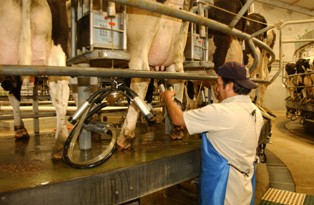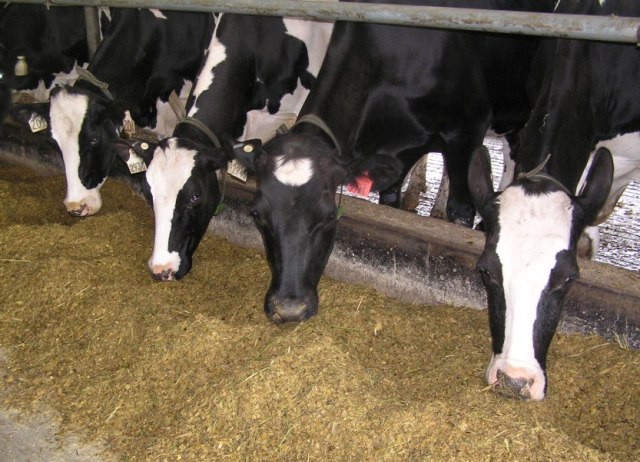 Farm Groups Coordinating Efforts to Capitalize on Opportunity to Reform Immigration Policies
Farm Groups Coordinating Efforts to Capitalize on Opportunity to Reform Immigration Policies
ARLINGTON, VA – The National Milk Producers Federation (NMPF) has joined a broad cross-section of organizations representing agricultural employers in a collective effort to reform federal immigration policies.
NMPF said today it is one of the founding members of the Agriculture Workforce Coalition (AWC). AWC’s goal is to seek legislation that ensures America’s farms, ranches and other agricultural operations have access to a stable and skilled workforce – an effort in which NMPF has been engaged for much of the past decade.
“After seven years of hard but fruitless work on this issue, dairy farmers have a rare opportunity in 2013 to achieve a comprehensive solution to the immigration policy challenge. We see our participation in this coalition as the best chance to shape federal policies that will ensure farm employers’ continued access to both existing and future dairy workers,” said Jerry Kozak, President and CEO of NMPF.
The AWC has been formed to move beyond previous immigration reform efforts. In particular, the Coalition, recognizing that existing programs and previous proposals have proved unworkable, is putting forward a framework that includes both an earned adjustment in status for current experienced farm workers, and a program to ensure that producers continue to have access to a workforce as current agricultural employees move on to other jobs.
A key to the framework proposed by AWC will be ensuring that it meets the needs of all of agriculture—both those employers with seasonal labor needs and those who provide year-round employment opportunities, such as dairy farms.
“We have tried to retrofit the H2A visa program for dairy farmers, but that effort was a more limited approach. Now, we have the opportunity to do something bigger and comprehensive, with a unique coalition that together will be able to do more than each of our groups alone could do,” said Jaime Castaneda, Senior Vice President of Strategic Initiatives & Trade Policy for NMPF.
American agriculture as we know it would not be possible without the contributions of more than 1.5 million hired workers each year. Beyond the farm gate, each of these workers supports two to three full-time jobs in the food processing, transportation, farm equipment, marketing, retail and other sectors. Ensuring that farmers, ranchers and growers have access to the workers they need to maintain their productivity and competitiveness will help support continued growth in employment across the economy and in areas far removed from farm country.
Additional information on the AWC can be found on its website: www.agworkforcecoalition.org.
About the Agriculture Workforce Coalition
The Agriculture Workforce Coalition (AWC) brings together organizations representing the diverse needs of agricultural employers across the country. AWC serves as the unified voice of agriculture in the effort to ensure that America’s farmers, ranchers and growers have access to a stable and secure workforce.
To help achieve this goal, the AWC has developed a framework that presents a viable solution to agriculture’s labor needs. The proposal includes both an earned adjustment in status for current agricultural employees who presently lack legal status and a program to ensure an adequate farm workforce in the future. Also, unlike current programs such as H2A, the AWC proposal is meant to ensure that all types of producers—including both those with seasonal labor needs and ones with year-round labor needs—have access to the workforce they need to remain productive and competitive.
Founding members of AWC:
American Farm Bureau Federation
American Nursery & Landscape Association
Florida Fruit & Vegetable Association
National Council of Agricultural Employers
National Council of Farmer Cooperatives
National Milk Producers Federation
USA Farmers
U.S. Apple Association
United Fresh Produce Association
Western Growers Association
Western United Dairymen
Coalition partners:
Agriculture Coalition for Immigration Reform
The National Milk Producers Federation (NMPF), based in Arlington, VA, develops and carries out policies that advance the well being of dairy producers and the cooperatives they own. The members of NMPF’s 30 cooperatives produce the majority of the U.S. milk supply, making NMPF the voice of more than 32,000 dairy producers on Capitol Hill and with government agencies.



 Last week, the U.S. Department of Agriculture (USDA) officially announced the terms for the Milk Income Loss Contract (MILC) program extension, as included in the fiscal cliff bill passed on January 1, 2013. The payment rate for September 2012 milk production is $0.59 per hundredweight, the last month in Fiscal Year 2012. The payment rate for October 2012 is approximately $0.02 per hundredweight, and there is no payment for November 2012.
Last week, the U.S. Department of Agriculture (USDA) officially announced the terms for the Milk Income Loss Contract (MILC) program extension, as included in the fiscal cliff bill passed on January 1, 2013. The payment rate for September 2012 milk production is $0.59 per hundredweight, the last month in Fiscal Year 2012. The payment rate for October 2012 is approximately $0.02 per hundredweight, and there is no payment for November 2012. In recognition of their commitment to the dairy industry, managing their farm for future generations, and being active in their local community, Blue Diamond Dairy was named Minnesota’s 2012 Producer of the Year by the Minnesota Milk Producers Association.
In recognition of their commitment to the dairy industry, managing their farm for future generations, and being active in their local community, Blue Diamond Dairy was named Minnesota’s 2012 Producer of the Year by the Minnesota Milk Producers Association. NMPF is now accepting applications for its National Dairy Leadership Scholarship Program for academic year 2013-2014.
NMPF is now accepting applications for its National Dairy Leadership Scholarship Program for academic year 2013-2014.



